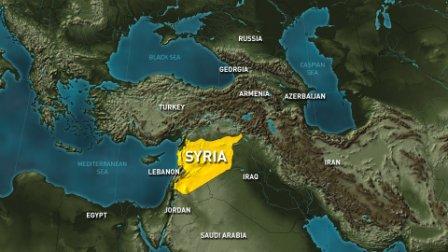 ONCUPINAR BORDER CROSSING, Turkey (CNN) -- Al Qaeda-linked militants were on the verge of capturing a strategic border gate between Turkey and opposition-controlled northern Syria late Wednesday night.
ONCUPINAR BORDER CROSSING, Turkey (CNN) -- Al Qaeda-linked militants were on the verge of capturing a strategic border gate between Turkey and opposition-controlled northern Syria late Wednesday night.
Hardline Islamist fighters from the Islamic State of Iraq and Syria (ISIS) made their advance toward the Turkish border hours after they attacked and pushed more moderate Syrian rebels out of the nearby Syrian town of Azaz.
"We are trying to bring reinforcements to make sure that the border crossing is not lost to the ISIS," said Abu Rashid, a commander from the Northern Storm Brigade, a rebel contingent from the opposition Free Syrian Army.
That rebel faction has controlled Azaz and the Syrian side of the Oncupinar-Bab el Salama border crossing with Turkey for the past year after it wrested control of the town from the government of Bashar al-Assad.
The fighting erupted first erupted in Azaz between FSA rebels and ISIS militants on Wednesday afternoon.
The clashes raised tensions on the Turkish side of the border as convoys of ambulances raced back and forth through the border gate and large numbers of Turkish border guards and plain-clothed security personnel deployed throughout the customs terminal, prohibiting journalists from filming the commotion.
The advance of the jihadist fighters threatens the main entry point for international aid on the main highway linking the Turkish city of Gaziantep and the divided Syrian northern metropolis of Aleppo.
In recent months, deliveries of U.S. humanitarian and nonlethal assistance to the opposition-held north have been trucked through the Bab el Salama gate. This was also the border crossing used by U.S. Sen. John McCain when he made a brief surprise visit to Syria to meet the commander of the Free Syrian Army.
During Wednesday's battle between the rival opposition groups in Azaz, a prominent opposition activist named Omar Hajouleh was shot dead by a sniper from ISIS, his brother said. Hajouleh was the head of the Azaz Media Center, a rebel-affiliated group that has long facilitated visits for foreign journalists to northern Syria.
"These guys (ISIS) are infidels. They killed my brother and wounded my other brother," said Hajouleh's older brother, Khaled, who wept as he spoke to CNN.
The elder Hajouleh said he had previously helped facilitate the arrival of foreign jihadist fighters from Turkey, some of whom volunteered to fight with the hardline ISIS militia in Syria.
"I let these guys in, and I totally regret it," said Khaled Hajouleh. "I thought these guys were coming to help us and protect us."
The apparent power play at the border by ISIS, one of the newest and most ideologically extreme jihadist groups to have established itself in Syria, immediately triggered calls for vengeance from the more moderate Free Syrian Army.
"[ISIS] are not rebels anymore; from this point, they are terrorists now," said Louay Almokdad, the political and media coordinator for the FSA, said in an interview broadcast live on CNN.
"We are fighting two terrorist teams on two fronts; one al-Assad regime and Hezbollah militia and the Iranian revolutionary guards and the other the extremists al Qaeda, ISIS," Almokdad added.
Until recently, there had been cooperation between the two groups.
Last month, ISIS' al Qaeda-linked fighters fought alongside the FSA to capture a long-besieged Syrian government airbase that's less than 20 minutes' drive from the Turkish border.
Government troops barricaded inside Minnigh Airbase had succeeded in holding out for months against the rebel siege. Their defenses finally collapsed on August 5, after an ISIS suicide bomber drove a captured armored personnel carrier loaded with explosives to the gates of the airbase and then detonated the huge mobile bomb.
The stated goal of ISIS is to establish an Islamic caliphate uniting Iraq and Syria. The group includes many foreign militants hailing from North Africa, Iraq, Lebanon, Turkey and other countries.
Eyewitnesses say some of the fighters wear suicide bomb belts as part of their daily uniform.
Portland and Seattle
Free Subscription to Breaking News
Free Subscription to Breaking News























































































































































































































































































































































